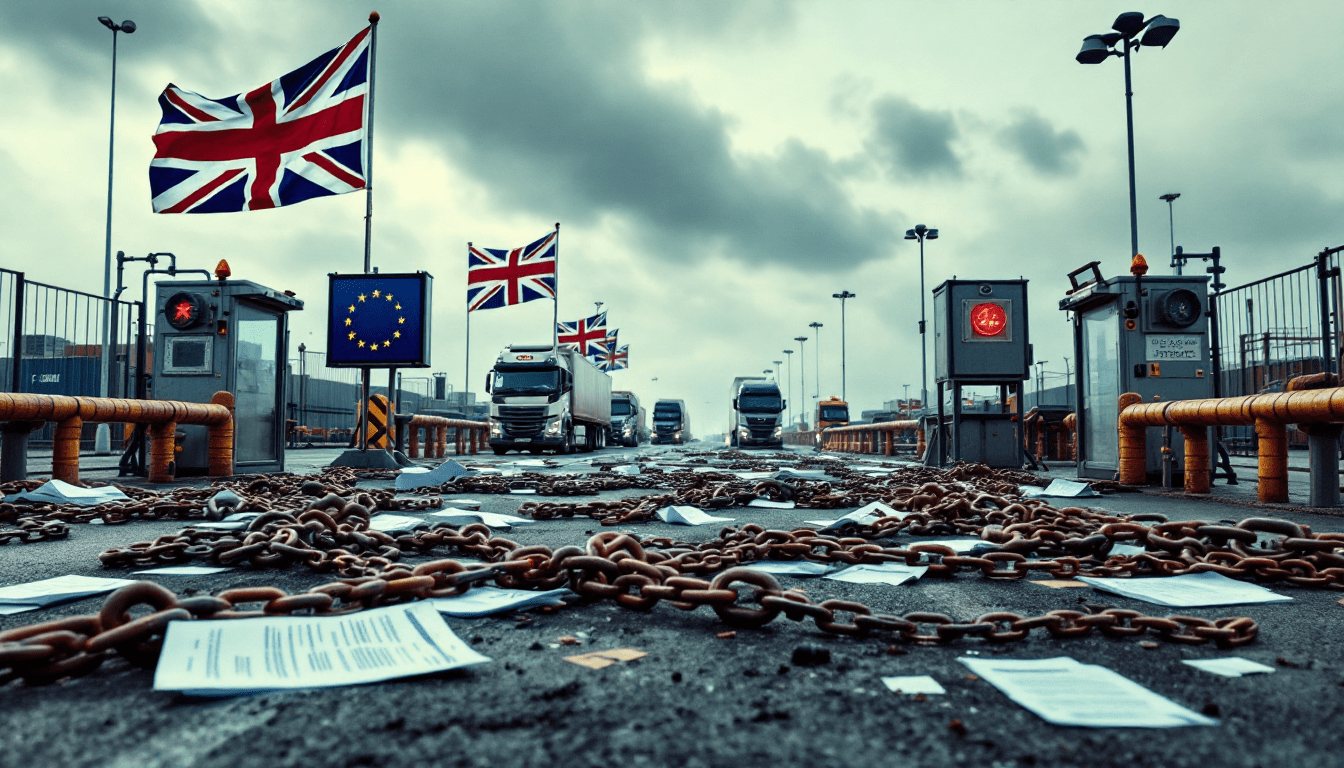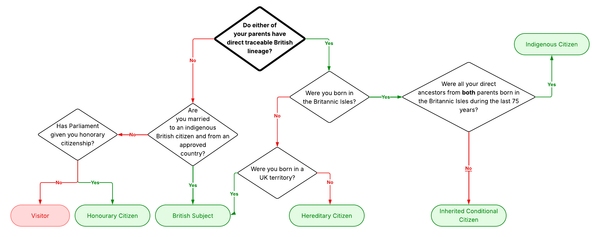Restoring the UK Political Tradition in the Face of 28th July
The UK executive is betraying our Glorious Revolution heritage by imposing EU law on Northern Ireland while giving EU goods easier access to GB than our own internal trade. Parliament must reclaim its constitutional supremacy before our union is undermined even further.

July holds deep significance for Northern Ireland. It marks our commemoration of the political liberties secured through the Glorious Revolution of 1688–89, and the military victory that safeguarded them in July 1690. The essence of the settlement was a critical recalibration in our constitution in the relationship between the executive and the legislature from which the legislature emerged pre-eminent.
That the largest and most vibrant annual celebrations of this watershed moment in the development of the UK political tradition take place in Northern Ireland says much about NI unionism and why we will never accept being ruled by a foreign executive, subjecting us to laws that we don’t make and can’t change.
Yet this is what the EU is now seeking to impose upon us and it was for the purpose of combatting their efforts in this regard (subjecting Northern Ireland to imposed EU law in 300 areas and cutting the UK into two by means of a custom and an international plant/animal health border) that I was honoured to be elected the Member of Parliament for North Antrim in July 2024.
After the conclusion of my first year, though, one of my observations is that in addition to being undermined through the Irish Sea border, the UK political tradition is being undermined in other mutually reinforcing ways as well.
Quite apart from the impact of the border, which not only unduly subjects us to an executive, (the EU Commission proposes all EU law) but to a foreign executive, the UK has in any event allowed its Glorious Revolution heritage to slip and for our executive to reassert its dominance over our legislature in some deeply troubling ways.
One of the principal expressions of this is found in the growth of UK secondary legislation which is generally regarded as a tool of the executive because it represents law that back-benchers cannot propose, and Parliament cannot amend. It can only engage by means of the ‘nuclear option’ of rejecting the legislation in its entirety after a short debate, something it deploys once in a blue moon. The last time the Commons did so was the Paraffin (Maximum Retail Prices) (Revocation) Order in October 1979. In some cases, the provision of a debate and vote on secondary legislation is not even offered but can be secured - according to the received wisdom – if MPs table a motion against it. What I have discovered, though, is that even if MPs table such a motion, the Government can still ignore it.
Over the past year, I have led efforts to challenge six separate pieces of secondary legislation that entrench the Irish Sea border and which the Government has sought to impose without a debate or vote. Each time, my goal was to trigger a debate and vote. Each time, the Government bypassed Parliament, imposing significant legal changes without scrutiny or accountability.
A particularly egregious example of this is demonstrated by the experience of the Official Controls (Extension of Transitional Periods) (Amendment) Regulations 2025 (S.I. 2025 No. 526).
These regulations are not only controversial because they recognise, and give effect to, the division of the United Kingdom of Great Britain and Northern Ireland into two by means of the imposition of a customs and international SPS (Plant and Animal Health) border. Crucially, they also bring an additional layer of controversy because they prevent arrangements defaulting to normal international border realities for the purpose of moving goods from EU countries into Great Britain, at exactly the same time as ensuring that trading goods from one part of the UK, Great Britain, to another, Northern Ireland, is subject to the full demands of a standard international border. In doing so they contribute to an overall legal framework that implies a greater sense of connection, commitment and obligation between GB and the EU, i.e. between foreign countries, than between GB and NI, i.e. within the same country.
On the one hand, the Official Controls Regulations 2025 deliver easements to the movement of some categories of animals, plants and other goods imported into the Great Britain part of the United Kingdom in relation to 4 key border requirements: prenotification, certification, location of checks (i.e. away from a Border Control Post), and frequency of checks, until 2027. Moreover, as the explanatory memorandum explains, the instrument:
… also delays the requirement for import checks (that applies to rest of the world countries) in respect of plants, plant products, or other objects (such as machinery and vehicles which have been used for agricultural or forestry purposes) entering GB from the EU, Liechtenstein or Switzerland through a West Coast Port before 31 January 2027 ...
In other words, they propose there should be no legal obligation to check any plants or plant products, or other objects within the definition, as they arrive from the EU into GB from 1 July 2025 until 2027.
On the other hand, the delivery of these easements, so as not to inconvenience EU traders and GB consumers, takes place at exactly the same time the UK Government retains legislation to subject movements of goods from Great Britain to Northern Ireland, from one part of our country to another, to the humiliation of the bluntest expression of an international border - the red lane - as if Great Britain is a foreign country in relation to Northern Ireland. Moreover, it has deemed it appropriate that there be no requirement for physical or identity checks on rest of the world product moving into GB from the EU, Liechtenstein or Switzerland, even as the green lane requires identity checks on 10 to 5% of comparable goods movements coming all the way from Scotland to Northern Ireland!!
What makes these regulations particularly toxic is that while they make July 2025 the month to reaffirm that normal border requirements are not necessary for the movement of foreign SPS goods (food and plant-animal based goods) from the EU into GB, July 28th 2025 is the date on which new border control posts become operational in relation to comparable goods movements from one part of the UK, GB, to another, NI, through the port of Larne. The same will be true of the port of Belfast from 11 August. Over £190 million of UK taxpayer’s money has been set aside to cement in the Irish Sea border even while the UK Government has seen fit to place no such burden on comparable foreign goods from the EU.
Government claims that the provision of these Border Control Posts within the UK, replacing the UK Internal Market - the economic foundation of the union - with a GB Internal Market for Goods and an all-Ireland Internal Market for Goods, are compliant with their obligation to uphold Northern Ireland’s place in the UK Internal Market in Section 46 of the Internal Market, are already farcical. But they degenerate into unbridled absurdity when seen in the context of their simultaneous efforts to place GB in more of an Internal Market with the EU than Northern Ireland.
The Official Controls (Extension of Transitional Periods) (Amendment) Regulations 2025 create an upside down, unsustainable world that seeks to break free from the obligations of belonging (heightened during the current period with its focus on ‘the politics of belonging’) on which functioning representative democracy depends. They demonstrate a greater respect for the rights of people in Greece and Estonia to trade with GB, than they demonstrate in relation to the rights of the people of the UK to trade with each other. In so doing, moreover, they accord GB consumers a greater right to avail themselves of goods from foreign countries than they afford to the people of NI to access goods from our home economy. To this end, they are implicated in the task of seeking to dissolve the grounds of belonging upon which a functional United Kingdom depends if it is to have a future.
Despite the huge controversy associated with this legislation, and the fact that a group of MPs from four different parties and one independent, sought a debate and vote on it, the executive rode roughshod over us and the legislation came into effect on 1 July without any debate and without any vote. As we consider the manner of the development of this legislation, its content and impact, it is hard to conceive of a more eloquent expression of a broken and dysfunctional politics. There has never been a greater need for our country to rediscover its constitutional identity, dignity and sense of purpose.





